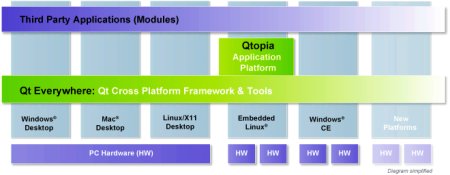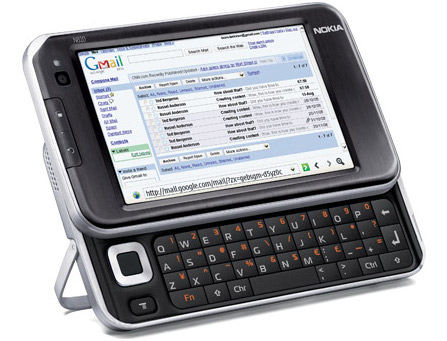Nokia completes Trolltech acquisition
Jun 18, 2008 — by Eric Brown — from the LinuxDevices Archive — 7 viewsFinland-based handset manufacturer Nokia announced that it has completed its acquisition of Trolltech. The Norwegian software firm's development talent — together with its Linux-compatible “Qt” application development framework — is likely to help Nokia improve its cross-platform support, and expand its presence in the Linux mobile device market.
The acquisition was estimated to be worth $150 million when it was announced in late January. Its completion comes on the heels of a June 5th announcement by the European Commission that it had unconditionally approved Nokia's voluntary tender offer for all Trolltech shares. Trolltech will be delisted from the Oslo Stock Exchange as of today, says Nokia.

Qt 4.4 architecture
(Click to enlarge)
The Finnish handset giant did not delineate the degree of autonomy the unit might enjoy under its new ownership. Nokia did, however, state: “In addition to the key software assets, the Trolltech team will play an important role in accelerating the implementation of Nokia's software strategy. This will enable Nokia to accelerate the cross-platform software strategy for mobile devices and desktop applications, and develop our Internet services business.”
When Nokia announced the proposed acquisition in January, it vowed to “continue the development” of Trolltech's products, and to continue licensing them under both commercial and open source licenses. At the time, the company also stated that the acquisition would boost the competitiveness of its S60 platform, which is used in dozens of Nokia and Samsung phones. In addition, Nokia noted a potential Trolltech role with its older Series 40 mobile phone software, which runs the more basic Nokia OS, and is said to be used in over 100 million devices.
The S60 technology is based on Symbian OS, which is 49 percent-owned by the company. Although still the leading handset OS, Symbian will gradually lose market share to upstarts like Linux and Windows Mobile in the smartphone market, according to a recent report from ABI Research. The report predicts that Linux will assume the number two OS spot behind Symbian in the smartphone market by 2013. It also suggests that Nokia is having difficulty selling its smartphones in North America.
According to a story by Reuters several weeks ago, Nokia plans to expand its line of Linux-based N8XX Internet Tablets, as well as experiment with Linux-based mobile handsets.
Expertise in cross-platform technology — and Linux
Trolltech's cross-platform Qt (formerly known as Qtopia Core) is an application framework that provides an API comprised of some 400 C++ class libraries. The framework is intended to let developers compile binaries for various operating system (OS) platforms from a single C++ code base. Qt is used in applications including Skype, Google Earth, and Adobe Photoshop Elements. The latest version, Qt 4.4, adds the open source Webkit browser engine, Phonon multimedia framework, and Qt Concurrency threads library for multicore. It also adds support for Windows CE and Windows Mobile as build targets. It seems likely that Qt will be modified to support Symbian and other mobile environments — or at least the newer, more Linux-like Symbian versions that have POSIX libraries and support for normal C++.
Trolltech sells a Qt for Embedded Linux subset of Qt designed for embedded Linux applications. It also recently upgraded its Qtopia Phone Edition mobile phone stack, which is popular among Linux mobile device developers.

Nokia N810 WiMAX Edition
In April, Nokia announced that it would be porting Trolltech's Qt libraries to Maemo, the OS used by its N8XX tablets, such as the new WiMAX-enabled version of the N810 (pictured above). In choosing the foundation for Maemo, Nokia broke with a long tradition in PDAs and other mobile devices, by eschewing “embedded” software development frameworks such as Qt, MicroWindows, and MiniGUI. Instead it chose the Gnome desktop environment and application development framework, which competes with KDE in the desktop Linux market. Years ago, the KDE project spawned the Webkit browser technology that was recently integrated into Qt, and it more recently developed the Phonon multimedia framework adopted by Qt. Last September, a community developer ported KDE to Nokia N8xx tablets. In another community port related to Nokia, a Nokia-sponsored project announced in April that it was porting the Ubuntu Linux distro to ARM.
In May, Trolltech announced financial results for the first quarter 2008, reporting earnings of NOK (Norwegian Krone) 55.6 million, or about $11 million US. The revenues represented a year-over-year growth of 15.5 percent, said Trolltech.
This article was originally published on LinuxDevices.com and has been donated to the open source community by QuinStreet Inc. Please visit LinuxToday.com for up-to-date news and articles about Linux and open source.